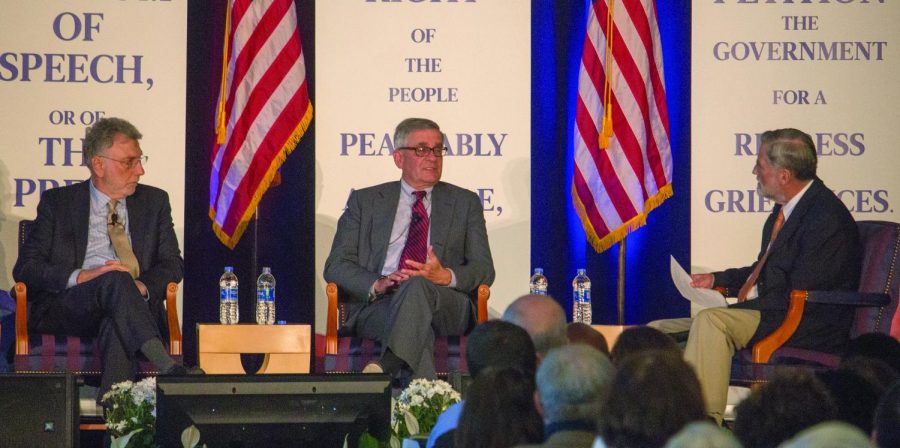First Amendment conference held at Duquesne
Photo by Robert Berger
Washington Post Executive Editor Martin “Marty” Baron speaks on a panel at the First Amendment conference at Duquesene.
October 23, 2018
Nationally-recognized and local media figures gathered on Duquesne University’s campus this Sunday and Monday to discuss the importance of the First Amendment.
“The National Conference on the First Amendment: Bedrock of American Freedoms” offered attendees the opportunity to learn about issues revolving around principles of freedom, impact of social media, artistic expression and more. Organizers included Ken Gormley, president of Duquesne University and Maxwell King, president and CEO of The Pittsburgh
Foundation.
“The problem is too many people in this country don’t understand how freedom works in their native land,” King said. “They don’t understand that the First Amendment is the linchpin freedom upon which our democracy was built.”
The first of its kind, the conference agenda slotted 17 panels, a musical performance by dance-rock band The Slants and a virtual appearance of Supreme Court Justice Ruth Bader Ginsburg, who was unable to travel to speak in person.
“May we not fail to learn the lessons of our past missteps, may we treasure the right to speak our minds out and remain respectful of the rights of others to do the same,” Justice Ginsburg said in a video presented to the
audience.
In the opening remarks on Sunday afternoon, King requested the audience to join him in a moment of silence honoring slain Washington Post journalist, Jamal Khashoggi.
“I want this moment of silence to honor his life, but also to honor his clear and courageous writing about freedom,” King said.
The conference has taken years to construct, according to Gormley, a legal professor and scholar who has spent years studying the First Amendment.
“Listening to differing views with respect and actually learning from them is what makes us the strongest country and what makes us stronger people,” Gormley said.
Rising above partisanship to candidly discuss pressing societal issues was an overarching theme across the two-day conference.
Sunday’s panels focused on discussing the “Five Pillars of Freedom” promised to American citizens in the First Amendment. A panel of collegiate professors shared their views on how these freedoms have shaped this country’s history. Panels that followed touched on the effects of social media on free speech.
A discussion of protected rights of freedom of expression followed, specifically relating to Matal V. Tam, a landmark case in constitutional and trademark law that was brought to court by bassist and founder of The Slants,
Simon Tam.
The evening closed with a musical performance by the group.
Monday’s panels consisted of nearly eight hours of speakers, opening with an editor’s conversation between Dean Baquet of The New York Times, Martin Baron of The Washington Post and David Shribman of the Pittsburgh Post-Gazette.
The editors spoke on the importance of the press in a democratic nation and how their media outlets strive to inform readers with facts.
“There are a lot of attacks on the press now,” Baron said. “I think there’s an attempt to marginalize us, to basically undercut us and undermine our role in society. We have have to be our own watchman of truth.”
Several Point Park students sat in on the Monday morning session. Taylor Fife, senior broadcast reporting major, said the event was informative for someone aspiring to become an accurate multimedia journalist.
“I liked the panel with the editors just because of the advice they were giving,” Fife said. “Hearing their thoughts on how to approach dealing with people who may not like the media, especially in this time period.”
Catering to the college students in the crowd as well as the educators in attendance, one panel looked into free speech on college campuses and how to strike a balance between protecting students and exposing them to an immersive learning experience.
“The question is what are you trying to teach them,” Robert Zimmer, president of the University of Chicago said. “Are you trying to convey truth or are you trying to teach them to think, they’re not the same thing. [Teaching them to think] is going to empower them for the rest of their lives.”
The conference also touched on issues regarding the collision of free speech and national security, the system of law and government in America, foreign journalists, fake news and more.
Point Park’s director of the Center for Media Innovation, Andrew Conte, also contributed to the organization of this conference, according to Gormley. He moderated an afternoon panel with controversial journalist James O’Keefe and Pittsburgh’s own Salena Zito, who regularly contributes to CNN, The Washington Examiner and The New
York Post.
The event closed with representatives from The National Constitution Center, The First Amendment Center and The Knights First Amendment Institute sharing how the public can solve the problem King posed at the start of the convention: misunderstanding the core of democracy.
“It’s the things that unite us – not the things that divide us – that make the United States of America a world power,” Gormley said. “The First Amendment is what sits at the core of all of that.”



















